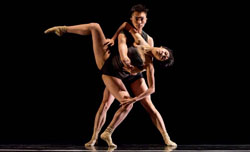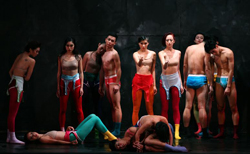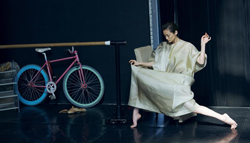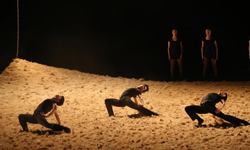Join the ICONS
Dance ICONS is a global network for choreographers of all levels of experience, nationalities, and genres. We offer a cloud-based platform for knowledge exchange, collaboration, inspiration, and debate. Dance ICONS is based in Washington, D.C., and serves choreographers the world over.
Subscribe today to receive our news and updates. Become a member of your global artistic community -- join the ICONS!
Yuan Yuan Wang: Passion in China

One of China's leading choreographers, Yuan Yuan Wang, is also the founder of the Beijing Dance Theater. Her pioneering work has been pivotal to the development of modern dance in China. ICONS spoke with Yuan Yuan Wang about her pathway to becoming one of the most prominent Asian female choreographers and the artistic challenges along the way.
Beijing Dance Theater will tour United States in February 2019, as produced by KMP Artists .
ICONS: When did you discover you were a choreographer?
Yaan Yuan Wang: I think it was when I graduated from the Beijing Dance Academy in the early 90’s. At that time, there was really only traditional Chinese dance and classical ballet in China. I was 19 years old and not really interested in either. I just wanted to develop something with my own body and my own movements. Many things were changing throughout Chinese society during that period. For example, gay rights were beginning to be recognized and the contemporary art scene was exploding -- it felt like something was coming. I choreographed a piece on my classmates for a Chinese choreographic competition. My piece won the best choreography award and I won the award for best dance performance, so it made me feel like I should continue.
ICONS: How did your work progress outside of the traditional dance and classical ballet outlets?
YYW: I went back to Beijing Dance Academy as a member of the school’s first modern dance program. My classmates and I helped create the department and were the first students to ever graduate in modern dance in China. I was the top student, so the school asked me to stay on as a faculty member to teach choreography and modern dance technique.
I taught for three years, but felt I was too young to be teaching others. I believe that choreography is a process that requires you to continue searching within yourself. I wanted to explore my own feelings more and observe new things. So, I quit my job and went to the United States for a Master’s program at the California Institute of the Arts.

ICONS: How did the American and Chinese study programs differ?
YYW: The approach and feeling of education is very different in the US and China. In China the basic movement training is very strong. Teachers are clear and firm. Chinese teachers always tell you what you’ve done wrong, push you to go in certain directions and tell you how to get there. Actually the ideas are not the students’ ideas -- they are the teachers’.
In the US it’s a different approach. During my first semester in California, I remember thinking that maybe I’m in the wrong school, because no one told me what I should be doing. The teacher always said, “Yes, good! You are very good!” At first I thought that I was already good, so I wondered why I was there. In the States they encourage you and push you to go further. I feel I now have an understanding of both education systems and was able to take with me the best parts of each.
ICONS: Did you ever consider working in the US or staying on after you graduated from The California Institute of the Arts?
YYW: At the time, I would have loved to stay longer in the US, but I was already married and had my first child, so I thought it was best to go back to China. Also, I had an invitation to create a full-length ballet for the National Ballet of China that same year. Plus the contemporary dance was just getting started here, so I saw a lot of opportunity in China.

ICONS: Where do your movements begin? How do you create movement?
YYW: I believe that the movement is a tool to express the idea. First I find my opinion and what I want to say. The script and the details are the first things that come to me. The second step is trying to find the movement that can reflect back the idea.
ICONS: What is at the core of your work?
YYW: Whatever kind of education or background you come from, you have to see and understand life for yourself. I think most of my ideas come to me because of real life and this remains constant. Ten or twenty years ago my work was focused on the emotions and what people feel in life. Recently I am more focused on the whole of China and society, considering both the human being and the collective. My own story is important to me, and becomes the opinion that I want to tell my audience. My process has matured and grown inside me over the years, but real life remains at the core.
ICONS: What are you working on right now?
YYW: My next work is based on a book written by a Chinese author and takes place over 100 years ago. It’s about a woman who has two lovers during wartime -- similar to Gone with the Wind, you could say, but it's a Chinese story.
The last project I worked on was Ibsen’s play Lady from the Sea. It was my first experience directing theatre and working with actors who were not dancers. For my upcoming project I’d like to revisit this and combine contemporary dance and theater.

ICONS: What are the artistic challenges of having your own company in contemporary China?
YYW: It is a good question because in China it’s very challenging. There is not a single modern or contemporary dance company supported by the government here. Only classical ballet and traditional Chinese folk dance companies receive funding, so if you want to do contemporary dance you need to do it yourself.
The biggest struggles are the financial ones. Funding comes from private sponsors and friends. We constantly strategize how to get enough money to pay the dancers, and to sell my work to theatres. We are a small team with one assistant, an accountant, a touring manager and my husband who is a set and lighting designer. I am lucky because until now, whenever I’ve faced a difficult moment or the company comes under financial pressure, there have been people who’ve supported me and helped keep the company going for 10 years already.
ICONS: What do you think it is about your work and company that inspires people to support you?
YYW: I think one reason is that our company is kind of like a dream in China. So when we have a problem, people really want to help. These people also have the dream and desire to push high quality contemporary arts. They are proud to see our productions staged internationally -- it’s something that belongs to China and shows that there is still life in China. That is kind of the dream.
ICONS: You’ve recently lost your studio workspace, could you talk about that?
YYW: Just last week there was a fire in the DaXing District of Beijing and the government asked the people who live there to leave and even pushed some out. Within three days they began to demolish and clear out apartments and storage spaces in that area. Our studio is close to the airport and is a very beautiful space. The Beijing government thinks our roof is similar to the building that caught on fire in DaXing and not up to safety standards. After the fire they asked everyone to leave these kinds of buildings. Our electricity, water and heating were cut off. So we cannot work there anymore.
ICONS: Can you ever go back?
YYW: No, I don’t think so. We spent a lot of money to build that space and now they’ve said, “Get out.” We are getting help from friends and people who have said, “You must continue -- you are the dream for us.” I feel so much warmth from these people, so I know I need to keep going. We need to find a solution.
ICONS: If you could go back and meet yourself 15 years ago, what advice would you give to your younger self?
YYW: I would tell myself to be braver and face all people and difficulties from early on with more confidence.

ICONS: How do you encourage young choreographers?
YYW: I really enjoy and believe in helping young choreographers. Chinese dancers have really great physical training, but there is a disconnect between the body and the ideas. I want to give them my experience of how to transfer the idea into the body and help them develop their own ideas Because of my experience as a teacher at BDA, I know the good and bad way for choreography education in China.
Within the company, I’ve always given space and time to my dancers to develop their own work. I also book theatres and spaces for them to perform their work. I’ve raised funds for some of the dancers who have become very mature so they can apply for and go to festivals and choreographic programs. I believe it’s really important for the company; the dancers need opportunities to develop as choreographers. In order to do that they need to have financial support -- they have to be able to pay their rent. I really try to build good relationships; I want my dancers to stay with me.
ICONS: Where do you see yourself and the company in 15 years?
YYW: For now, I would like to keep making my own work and find the best way to continue this company. The first step is to find a new studio.
The big picture dream is for the company to continue even after I die. Not for myself but for a new generation. We could say that freedom is the soul of dance. If we hold on to that idea and keep the company going, then our art can continue independently. That is important for China and for dance in China.
ICONS: As a choreographer what do you feel passionate about?
YYW: As a choreographer, the creative process is a passionate experience. Every inspiration takes a physical shape, and every step is exciting. When the dance is completed and about to premiere on stage for the first time, it feels like opening a mysterious gift to myself and to everybody watching.
Video sample:
More about Yuan Yuan Wang:
Born and raised in Beijing, Yuan Yuan Wang prides herself on being rooted in Chinese traditions, while simultaneously producing innovative, authentic, and thoughtful contemporary dance works for the world stage. She studied choreography at Beijing Dance Academy, where she later served as teacher. Between 2000 and 2002, she was trained in the Master of Fine Arts (MFA) program at the California Institute of Arts (Cal Arts) School of Dance. In 1998, she was named resident choreographer of the National Ballet of China and successively staged Butterfly Lovers, Rainbow of the Night, Attraction, Lost Emotion, Fate and a Chinese version of Nutcracker. Later, she choreographed a ballet version of Raise the Red Lantern for film director Zhang Yimou and the dance sequences for Tan Dun’s music in the film The Banquet for Director Feng Xiaogang.
She has served as guest choreographer at New York City Ballet Choreography Institute, Hong Kong Academy for Performing Arts (School of Dance), Royal Danish Ballet, and Shanghai Ballet. Yuan Yuan Wang has won many international “Best Choreographer” awards and enjoys the distinction of holding the most "Best Choreographer" awards internationally among Chinese choreographers. Her works have been staged widely around the globe.
In 2008, she founded Beijing Dance Theater with veteran lighting designer Han Jiang and set designer Tan Shaoyuan. Diary of Empty Space was premiered the same year as their first creation, followed by Stirred from a Dream, Haze, Prism, The Color of Love, Martlet, Harvest, Golden Lotus and Hesitation.
Photography by: Han Jiang, Chen Lei, Sharen Bradford and Wang Xiao Ning
Courtesy of Beijing Dance Theatre, 2018 ©
Interviewer: Jessica Teague
Editor: Camilla Acquista
Courtesy of Dance ICONS, Inc., February 2018 ©
